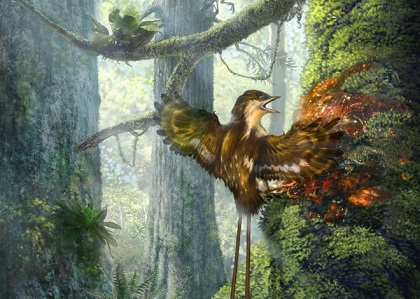Two wings from birds that lived alongside the dinosaurs have been found preserved in amber.
The “spectacular” finds from Myanmar are from baby birds that got trapped in the sticky sap of a tropical forest 99 million years ago.
Exquisite detail has been preserved in the feathers, including traces of colour in spots and stripes, according to BBC.
The wings had sharp little claws, allowing the juvenile birds to clamber about in the trees.
The tiny fossils, which are between two and three centimetres long, could shed further light on the evolution of birds from their dinosaur ancestors.
The specimens, from well-known amber deposits in north-east Myanmar (also known as Burma).
Co-author Prof Mike Benton, from the University of Bristol, said: “The individual feathers show every filament and whisker, whether they are flight feathers or down feathers, and there are even traces of colour – spots and stripes.”
The hand anatomy shows the wings come from enantiornithine birds, which comprised a major bird grouping in the Cretaceous Period. However, the enantiornithines died out at the same time as the dinosaurs, 66 million years ago.
Dr Steve Brusatte, a vertebrate palaeontologist at Edinburgh University, described the fossils as “spectacular”.
He told BBC News: “They’re fantastic – who would have ever thought that 99-million-year-old wings could be trapped in amber?
“These are showcase specimens and some of the most surprising fossils I’ve seen in a long time. We’ve known for a few decades that many dinosaurs had feathers, but most of our fossils are impressions of feathers on crushed limestone slabs.
“Three dimensional preservation in amber provides a whole new perspective and these fossils make it clear that very primitive birds living alongside the dinosaurs had wings and feather arrangements very similar to today’s birds.”
The international team of researchers used advanced X-ray scanning techniques to examine the structure and arrangement of the bones and feathers.
Claw marks in the amber suggest the birds were still alive when they were engulfed by the sticky sap.
H.Z

